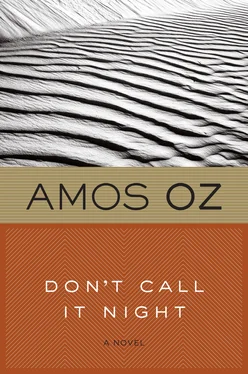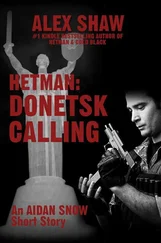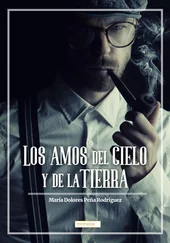I decided I should find the time to get him to talk.
But I didn't find the time. I forgot. Put it off. I have three classes and two literature sets, including the special set for recent immigrants. Each one has close to forty pupils most of whom have a tortured look. I'm rather fed up myself, after all these years. Now I don't even bother to remember their names. They're almost all girls; they mostly wander around all through the summer in bright-coloured shorts with a tear at the very edge of the crotch; they're almost all called Tali. Actually, there's always one in every class who keeps correcting me, it's not Tali it's Tal, or vice versa.
The truth is that until after it happened I didn't even know as much about Immanuel Orvieto as his class teacher and his counsellor did: that he had been living here in Tel Kedar from the age of ten with an unmarried aunt who worked in a bank. That his mother was killed a few years ago in the Olympic hijack. That his father is in Nigeria as a military adviser. There was a vague story circulating in the staff room that the boy had fallen in love or got involved with some girl in Elat, several years older, who was a junkie and might even be a pusher. Before the incident, I listened to this with only half an ear, because the staff room is always full of all sorts of gossip. So is the whole town, for that matter.
He was found not far from the abandoned copper mine near Elat, after he had disappeared from his aunt's home and been missing for ten days. He had fallen off a cliff. Or jumped. He had broken his back and apparently lay dying at the foot of the cliff for a day and half a night before he finally expired. It was to be hoped that he had not been conscious all that time, but there was simply no way of knowing. He had previously been taken there and been drugged, or drugged himself, or been tempted. I tried not to listen to these things, which here always come accompanied by excitable voices and gestures of stunned self-righteousness and a hint of secret glee: Look, what do you mean a backwater, look, we've made it to the national news, real-life excitement has come to us, too, and there's a well-known journalist and a photographer, they've been prowling around outside since this morning but the executive have decided that none of us must be interviewed, we have to answer No comment.
The funeral was postponed twice because the father was delayed. A couple of days later the aunt died too, and the talk in the staff room was of a stroke, guilt feelings, the hand of fate. All kinds of cackle that I tried not to listen to. The fact is, I loathed the father even before seeing him. An absentee father, an arms-dealer, in Nigeria, probably foil of complaints, probably only blaming us. It isn't difficult to pass judgment from a distance, on the basis of a few hints that converge into a conclusion. I imagined the father as a kind of ex-stormtrooper, prosperous, judgmental and self-righteous. I made up my mind not to participate in the delegation from the staff room that went to see him in his room at the Kedar Hotel even before the funeral. From the African jungle, here he was at last condescending to come here only to blame us for the awful fate of his son, how did we fail to see, why did we ignore, surely it was inconceivable that the entire teaching staff? In the end I went anyway, maybe because I recalled the boy's way of standing, quiet yet nevertheless disturbing, shy, as though plunging to his own seabed before surfacing and telling me almost in a whisper that words are a trap. There was a quiet plea for help in these words that I either didn't catch or caught and ignored. And so, refusing to recognize and recognizing and rejecting the recognition that if I had chatted with Immanuel, if only I had tried to get a little closer to him, and shrugging what the hell, drop it, you're crazy, I went along with the other teachers to meet Avraham Orvieto a few hours before they buried the boy and his aunt. There, in the hotel, in the father's room, this thing began that has filled the whole of my being ever since.
There was also the episode of the dog. Immanuel Orvieto had a dog, a depressive creature that always kept its distance. From the morning to the end of lessons he would lie and wait for the boy in the sparse tamarisk grove which grew, or rather decayed, opposite the school gate. If you threw stones at him he would get up wearily and pad a few yards away and lie down again to wait. After the calamity, this dog started coming into the classroom each morning, oblivious of the chaos in the corridors, mangy, floppy-eared, his drooping muzzle almost touching the dusty floor. Nobody dared to shoo him away or bother him during the days of mourning. Or even afterwards. He lay there the whole morning, with his sad, triangular head resting, motionless, on his front paws. He had selected a regular spot in a corner of the classroom next to the wastepaper basket. If anyone threw him half a roll or even a slice of salami in break, he did not bother to sniff it. If he was spoken to, he did not react. He had a pitiful, brown, bewildered look that forced you to look away. At the end of lessons he would slink out abjectly with his tail between his legs, and vanish until the eight o'clock bell the next morning. A Bedouin dog, not young, the colour of the earth hereabouts: a faded grey. Dusty. Now, in hindsight, I think he may have been dumb, because I don't recall him ever uttering a bark or even a whine.
Once he made me want to take him home with me, to bathe and feed him and make him happy: his undying devotion to a boy who would never return suddenly touched me. If I fed him milk from a spoon and got the vet to take care of him and made him a bed in the hall, he might eventually get used to me and let me stroke him. Theo detests dogs but he'd be bound to give in because he's the giving-in sort. If only I knew how to make him understand how oppressive I find his overwhelming consideration. I could see him screwing up his small eye, the left one, with his silvery retired British army major's moustache concealing a slight quiver: Look here, Noa, if it really matters to you, and so forth. So I gave up the dog. He was a pretty repulsive creature and the truth is that he showed no sign of needing a new attachment.
One morning he was run over. Nevertheless, he still arrived in class precisely on the first bell. His hind legs were smashed and looked like broken twigs. He dragged himself to his regular spot and lay there as usual. There was not so much as a whimper. I made up my mind to call the Public Health Department vet to come and take him away, but at the end of the day he vanished and the next day he didn't come back. We thought he must have dragged himself away to die in some secluded place. A couple of months later, the evening of the class party, after the greetings and the sketches and the refreshments and the headmistress's speech, when we left at one o'clock in the morning, the dog appeared again, bony, misshapen, cadaverous, wriggling along on his forelegs and dragging his paralyzed hindquarters, crossing the light of the lamp in front of the grubby tamarisk grove opposite the school gate, creeping from darkness to darkness. Unless it was another dog. Or just a shadow.
Avraham Orvieto stood to greet us, leaning back against the door of the balcony from which the mountaintops to the east could be seen shimmering in the heat haze. A small suitcase was lying shut on the hotel double bed. Two lemons on the table. A lightweight summer jacket draped over the back of the chair behind it. He was a small, frail, narrow-shouldered man, his thinning hair was turning white, his wrinkled face was suntanned, he looked like a retired metal worker. This was not the image I had of a military adviser or an international arms-dealer. I was especially surprised when he started talking to us, without waiting for the formal condolences, about the need to prevent other schoolchildren from falling victim to drugs. Speaking in a colourless voice, with a kind of hesitancy, as though he were afraid of making us angry, he asked whether Immanuel was the only one of our pupils to succumb. And he asked us to tell him how long we had known about it.
Читать дальше












